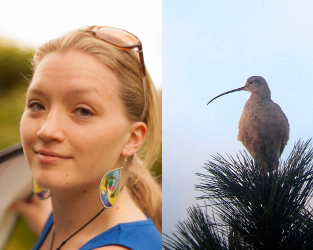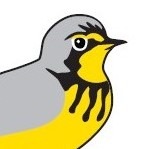Bird Studies Canada’s summer staff are supporting bird research and conservation through placements with our scientists. Find out what they’re up to in British Columbia, Ontario, and the Maritimes this year!
British Columbia

Cayla Naumann Photo: Dirk Slot
Long-billed Curlew Photo: Cayla Naumann
Cayla Naumann is working on the Long-billed Curlew Project funded by the B.C. Hydro Fish & Wildlife Compensation Program, the Habitat Conservation Trust Foundation, and the Columbia Basin Trust. Cayla completed her B.Sc. and M.Sc. at the University of Victoria and recently received her Registered Professional Biologist designation from the B.C. College of Applied Biology. In the past, she has worked in avian wildlife management and in Loggerhead Shrike recovery.
“Working with the Long-billed Curlews so far has been very rewarding and challenging,” says Cayla. “For such a large bird, they are good at hiding their nests and remaining elusive. I look forward to continuing their monitoring through the season, and maybe getting a glimpse of their young – although I have heard they are very protective parents!”
Ontario

Christoph Ng Photo: Jessica Vigneron
Nine seasonal staff are contributing to research on Bank Swallows and Barn Swallows, Forest Birds at Risk Programs, the Toronto Urban Bird Program, and the Great Lakes Marsh Monitoring Program. These projects are funded by the Government of Canada, the Ontario Ministry of Natural Resources and Forestry, the W. Garfield Weston Foundation, the TD Friends of the Environment Foundation, the Ontario Trillium Foundation, Wildlife Habitat Canada, and the Great Lakes Restoration Initiative.
Among these staff is Christoph Ng, who is encouraging bird appreciation in Toronto through public outreach. Christoph recently defended his Master’s thesis in Natural Resources Management at the University of Manitoba.
“I applied for a job with Bird Studies Canada because I’m passionate about Citizen Science and conservation,” says Christoph. “I believe that fostering a personal connection with wildlife and nature is essential for furthering the conservation movement, especially in a dense urban environment like Toronto.”
Four additional biologists helped conduct intensive research and monitoring for Long Point Bird Observatory’s breeding bird projects this summer, with support from the Nature Conservancy of Canada.
Atlantic Provinces
Thirteen seasonal staff are gaining extensive field experience and technical skills as they survey forests, wetlands, and coasts for at-risk species such as Piping Plover, Bicknell’s Thrush, Canada Warbler, and Olive-sided Flycatcher. They are also maintaining the Motus Wildlife Tracking System, engaging landowners in responsible stewardship of swifts and swallows, monitoring the health of marsh birds and frogs, and studying complex relationships between shorebirds and human beach users along the Bay of Fundy. At the same time, they are developing life skills as they overcome diverse challenges, from thick clouds of blackflies to flat tires on field vehicles.
These projects in the Maritimes are funded in part by Canada Summer Jobs, New Brunswick Wildlife Trust Fund, PEI Wildlife Conservation Fund, Nova Scotia Habitat Conservation Fund, and Nova Scotia Labour and Advanced Education.
We gratefully acknowledge our funders, and our outstanding summer staff, for all the valuable work being done across the country this year.

